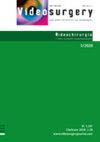腹腔镜手术中的泌尿外科住院医师培训——波兰首次全国调查结果
IF 1.6
4区 医学
Q2 SURGERY
引用次数: 5
摘要
引言在许多泌尿外科手术中,开放式入路正被腹腔镜入路所取代。腹腔镜技术需要特殊的训练条件。一个精心设计、循序渐进的训练计划对于缩短学习曲线非常重要。目的本研究的目的是评估波兰泌尿外科住院医师在腹腔镜手术、培训模式和可用设施方面的经验。材料和方法作者开发的调查包括18个关于腹腔镜培训的问题,并在2017年参加波兰UR腹腔镜手术2个课程的UR中进行了分发。该调查包括腹腔镜手术的数量、获得的腹腔镜经验、腹腔镜模拟训练和进一步学习的动机等问题。结果在2017年受邀的波兰UR中,108人(34%)完成了调查。来自研究组的72名(78%)UR可以在他们的科室进行腹腔镜手术。只有20(25%)的泌尿外科配备了腹腔镜检查箱,少数UR进行定期培训。作为主要操作人员,腹腔镜手术分别由55(71%)UR和8(10%)UR执行基本(精索静脉曲张修复)和高级(如根治性肾切除术、根治性前列腺切除术、保留肾单位手术)。大多数居民认为他们的腹腔镜技术较差(15%、19%)、非常差(31%、40%)或缺席(10%、13%),而只有22人(28%)认为他们至少满意。结论腹腔镜技术在大多数波兰培训中心都可用。然而,大多数UR认为他们的技能不令人满意。此外,大量波兰UR无法接受强化培训。UR认为,他们可获得的培训课程和研究金很少。波兰UR的手术暴露主要包括轻微的腹腔镜手术。本文章由计算机程序翻译,如有差异,请以英文原文为准。
Urology resident training in laparoscopic surgery – results of the first national survey in Poland
Introduction For many urological procedures the open approach is being replaced by the laparoscopic approach. Laparoscopy technique requires special training conditions. A well-designed, step-by step training program is significantly important for shortening the learning curve. Aim The purpose of the study was to evaluate urology residents’ (UR) experience in laparoscopic procedures, training patterns and facilities available in departments of urology in Poland. Material and methods The survey developed by the authors included 18 questions concerning laparoscopy training and was distributed among UR who participated in 2 courses in laparoscopic surgery for UR in Poland in 2017. The survey consisted of questions regarding the number of laparoscopic procedures, acquired laparoscopic experience, laparoscopic simulation training and motivation for further learning. Results Of the 2017 invited UR in Poland, 108 (34%) completed the survey. Seventy-two (78%) UR from the study group have access to laparoscopic surgery in their department. Only 20 (25%) of urology departments are equipped with a laparoscopy box and a small number of UR perform regular training. As a primary operator basic (varicocele repair) and advanced (e.g. radical nephrectomy, radical prostatectomy, nephron-sparing surgery) laparoscopic procedures are performed respectively by 55 (71%) UR and 8 (10%) UR. Most residents evaluated their laparoscopic skills as poor (15, 19%), very poor (31, 40%) or absent (10, 13%), while only 22 (28%) evaluated them as at least satisfactory. Conclusions Laparoscopic technique is available in most Polish training centers. However, the majority of UR consider their skills unsatisfactory. Additionally, a large number of Polish UR do not have access to intensive training. UR considered that their availability of training courses and fellowships is low. Surgical exposure among Polish UR comprises mainly minor laparoscopic procedures.
求助全文
通过发布文献求助,成功后即可免费获取论文全文。
去求助
来源期刊
CiteScore
2.80
自引率
23.50%
发文量
48
审稿时长
12 weeks
期刊介绍:
Videosurgery and other miniinvasive techniques serves as a forum for exchange of multidisciplinary experiences in fields such as: surgery, gynaecology, urology, gastroenterology, neurosurgery, ENT surgery, cardiac surgery, anaesthesiology and radiology, as well as other branches of medicine dealing with miniinvasive techniques.

 求助内容:
求助内容: 应助结果提醒方式:
应助结果提醒方式:


